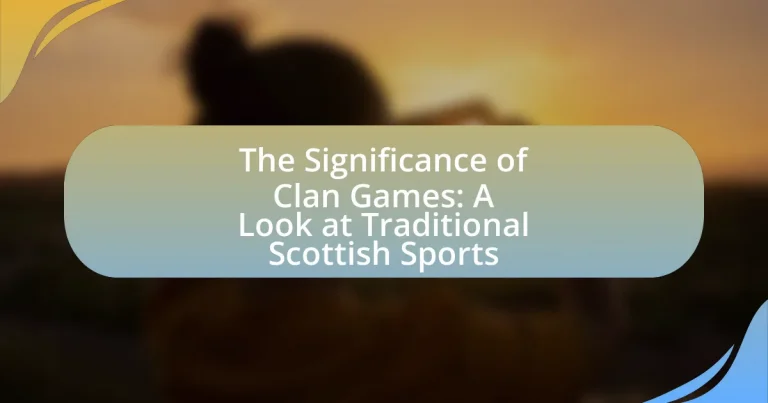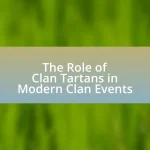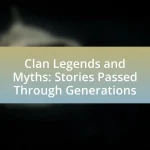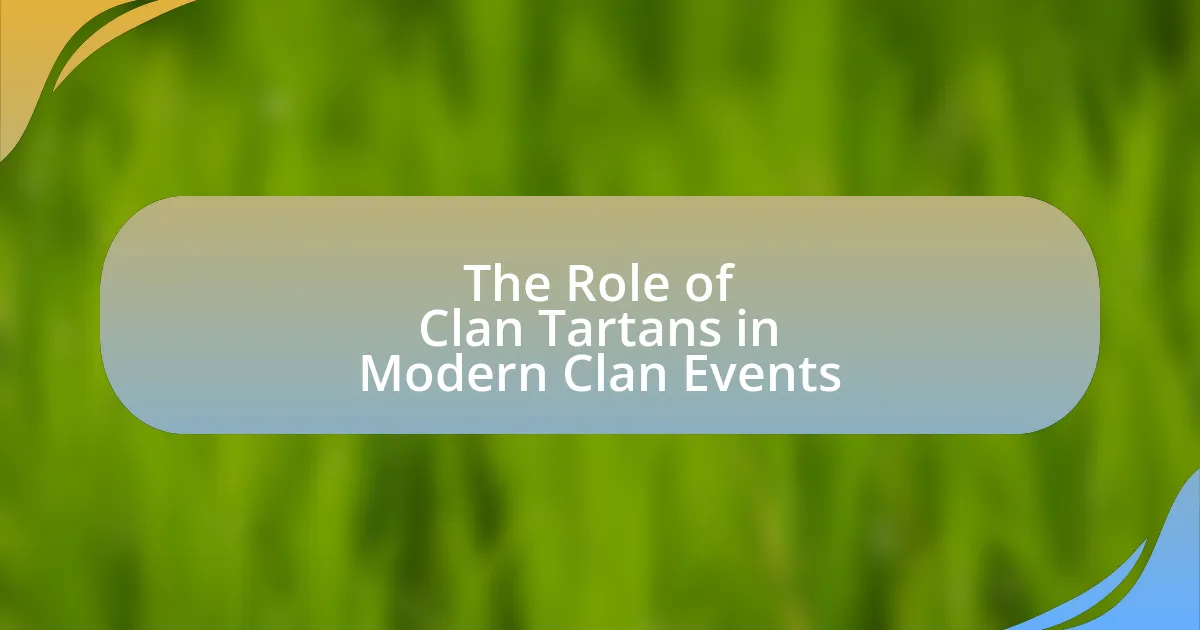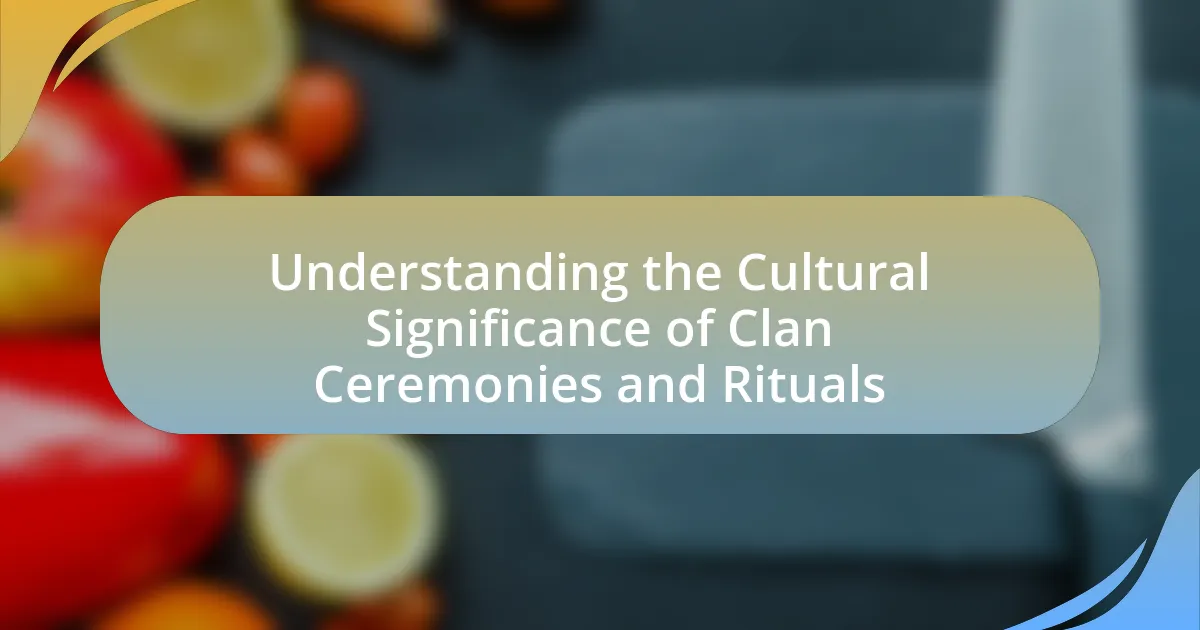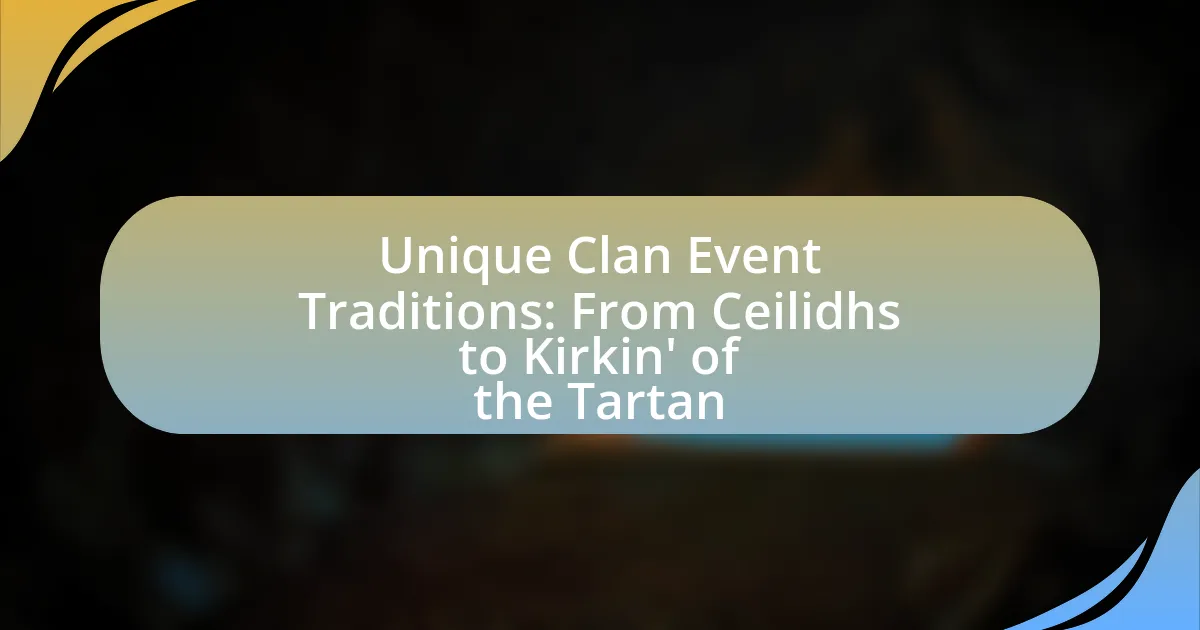Clan Games are traditional Scottish sporting events that celebrate clan heritage and community spirit, originating in the 19th century. These games, which include competitions such as caber tossing and tug-of-war, serve to showcase strength, skill, and teamwork while reinforcing clan loyalty and cultural identity. The article explores the historical context of Clan Games, their evolution into modern Highland Games, their cultural significance in preserving Scottish heritage, and their impact on community pride and tourism. Additionally, it addresses the challenges faced by Clan Games today and outlines best practices for participation and engagement.
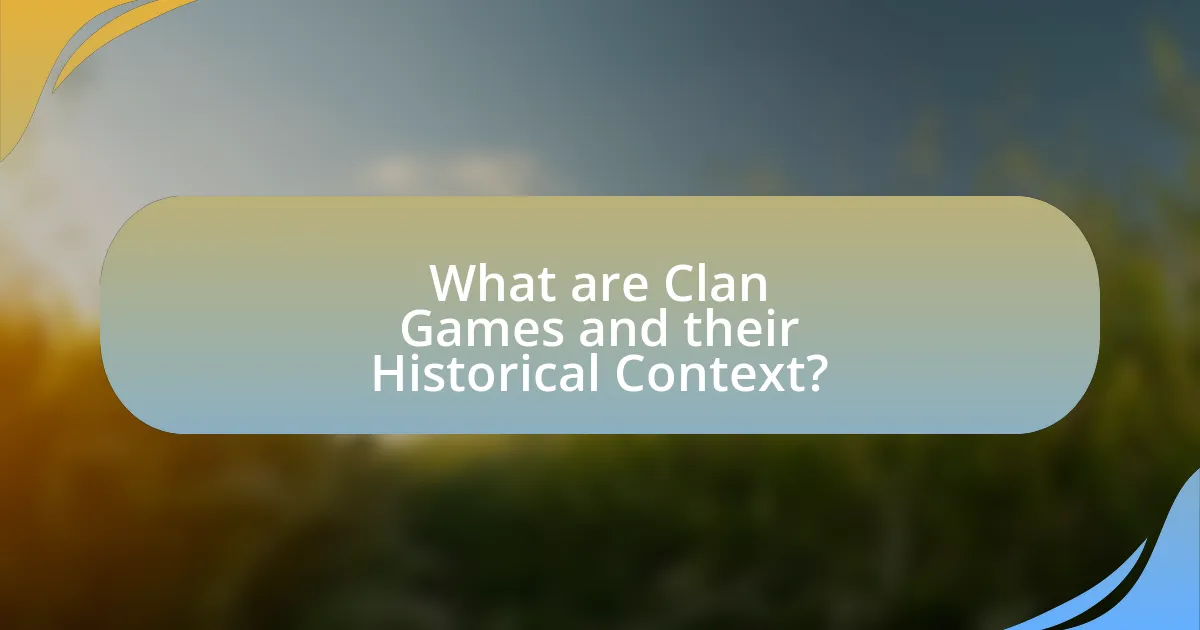
What are Clan Games and their Historical Context?
Clan Games are traditional Scottish sporting events that celebrate clan heritage and community spirit, often featuring competitions in strength, skill, and teamwork. Historically, these games date back to the 19th century, with roots in earlier gatherings where clans would showcase their prowess through athletic contests, fostering unity and pride among clan members. The first recorded Clan Games took place in 1822 during the visit of King George IV to Scotland, which spurred a revival of Scottish culture and traditions. These events have since evolved into modern Highland Games, preserving the cultural significance and competitive spirit that originally characterized clan gatherings.
How did Clan Games originate in Scotland?
Clan Games originated in Scotland as a means for clans to showcase strength, skill, and unity during gatherings, particularly in the 19th century. These events evolved from traditional Highland gatherings where clans would compete in various athletic contests, such as caber tossing and tug-of-war, to foster camaraderie and celebrate cultural heritage. Historical records indicate that the first organized Clan Games took place in 1822 during the visit of King George IV to Scotland, which spurred interest in Highland culture and athletic competitions.
What cultural significance do Clan Games hold in Scottish history?
Clan Games hold significant cultural importance in Scottish history as they serve as a celebration of Scottish heritage, identity, and community. These events, which date back to the 19th century, were originally organized by clans to showcase strength, skill, and unity among clan members. The games include traditional sports such as caber tossing and tug-of-war, which not only highlight physical prowess but also reinforce clan loyalty and camaraderie. Historically, Clan Games have acted as a means of preserving Scottish traditions and fostering a sense of belonging, particularly during times of social and political change, such as the aftermath of the Jacobite uprisings.
How have Clan Games evolved over time?
Clan Games have evolved from informal gatherings of Scottish clans showcasing strength and skill into organized events that celebrate cultural heritage and community. Initially, these games featured traditional athletic competitions such as caber tossing and tug-of-war, primarily serving as a means for clans to demonstrate prowess and unity. Over time, the introduction of standardized rules and the inclusion of various events, such as dancing and piping competitions, transformed Clan Games into structured festivals that attract participants and spectators from around the world. This evolution reflects a broader trend of preserving Scottish culture while adapting to contemporary interests, evidenced by the increasing number of international competitions and the incorporation of modern elements to engage younger audiences.
What role do Clan Games play in Scottish identity?
Clan Games serve as a vital expression of Scottish identity by fostering a sense of community, heritage, and cultural pride among participants and spectators. These events, which include traditional sports such as caber tossing and tug-of-war, are deeply rooted in Scotland’s history and clan culture, reflecting the values and traditions of Scottish society. The games not only celebrate athleticism but also reinforce connections to ancestral clans, as many participants represent their family lineage, thereby promoting a collective identity. Historical records indicate that Clan Games have been held for centuries, with significant gatherings documented as early as the 11th century, underscoring their longstanding importance in Scottish culture.
How do Clan Games foster community and clan pride?
Clan Games foster community and clan pride by providing a platform for members to engage in friendly competition and celebrate shared heritage. These events encourage collaboration among participants, strengthening bonds through teamwork and collective achievement. For instance, the participation of clans in traditional events like tug-of-war or caber tossing not only showcases individual skills but also highlights the unity and identity of the clan. Historical records indicate that Clan Games have been a part of Scottish culture for centuries, reinforcing social ties and instilling a sense of belonging among clan members. This communal spirit is further amplified by the presence of spectators, who support their clans, thereby enhancing pride and loyalty within the community.
What impact do Clan Games have on Scottish heritage preservation?
Clan Games significantly contribute to the preservation of Scottish heritage by fostering a sense of community and cultural identity among participants and spectators. These events celebrate traditional Scottish sports, such as caber tossing and tug-of-war, which are rooted in Scotland’s historical practices and customs. By organizing Clan Games, communities actively engage in the transmission of cultural knowledge and skills to younger generations, ensuring that these traditions are not lost over time. Furthermore, the games attract tourism, which generates interest in Scottish history and culture, thereby reinforcing the importance of heritage preservation. The ongoing popularity of Clan Games demonstrates their role as a living expression of Scottish identity, linking contemporary society with its historical roots.
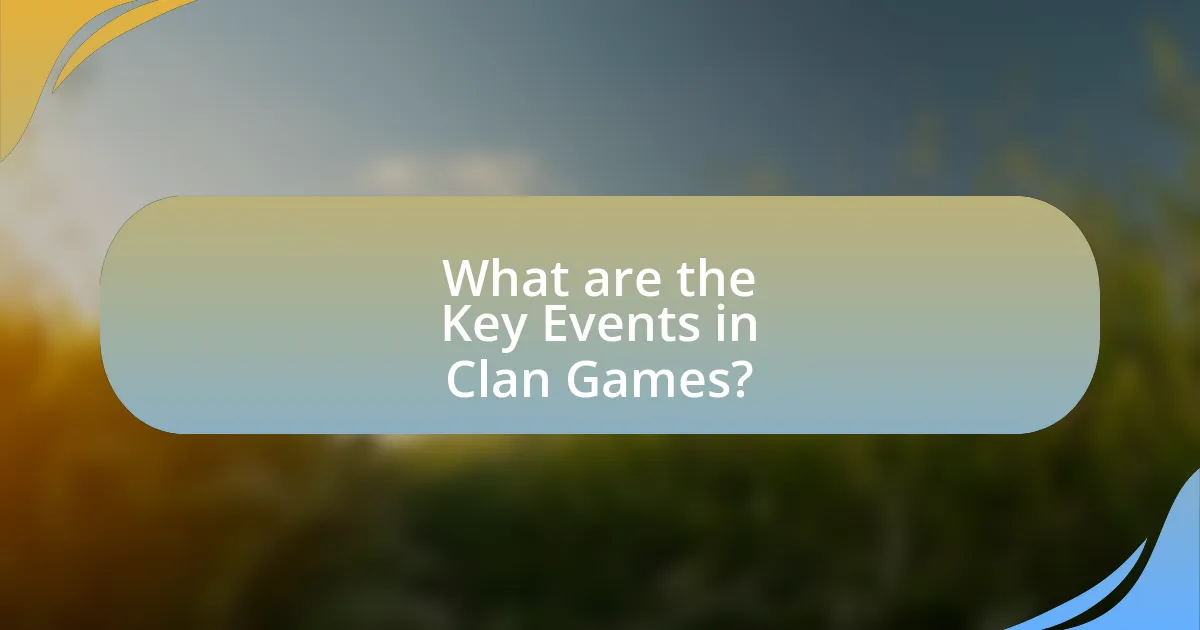
What are the Key Events in Clan Games?
Key events in Clan Games include the caber toss, tug of war, hammer throw, and stone put. The caber toss involves lifting and flipping a tall log, showcasing strength and technique. Tug of war tests teamwork and strength between clans. The hammer throw consists of swinging a heavy weight attached to a long handle, demonstrating power and skill. The stone put requires competitors to throw a heavy stone as far as possible, emphasizing both strength and technique. These events are integral to Clan Games, reflecting traditional Scottish culture and athleticism.
What traditional sports are featured in Clan Games?
Clan Games feature traditional sports such as caber tossing, hammer throw, tug of war, and stone put. These events are integral to Scottish culture and heritage, showcasing strength, skill, and teamwork. For instance, caber tossing involves lifting and flipping a tall log, which tests both technique and physical power, while the hammer throw requires athletes to swing a heavy weight attached to a long handle, demonstrating athletic prowess.
How do events like caber toss and tug of war reflect Scottish culture?
Events like caber toss and tug of war reflect Scottish culture by showcasing traditional values of strength, community, and competition. The caber toss, a test of physical prowess, symbolizes the importance of skill and endurance in Scottish heritage, often associated with the Highland Games, which date back to the 11th century. Tug of war, on the other hand, emphasizes teamwork and unity, reflecting the clan system that is central to Scottish identity. Both events serve as a celebration of Scottish history and social cohesion, reinforcing cultural pride and communal bonds during gatherings.
What are the rules and formats of these traditional sports?
Traditional Scottish sports, particularly those featured in clan games, follow specific rules and formats that govern their execution. For example, in caber tossing, the athlete must lift a tall, heavy log and toss it end over end, aiming for a straight landing. The format typically involves competitors taking turns, with judges assessing the toss based on its straightness and distance. In the hammer throw, participants swing a heavy weight attached to a long handle and release it within a designated area, with the longest throw winning. Each sport has its own set of scoring criteria and safety regulations to ensure fair competition and participant safety. These rules and formats have been passed down through generations, reflecting the cultural heritage of Scotland.
How are Clan Games organized and executed?
Clan Games are organized through a collaborative effort among clan leaders and local communities, typically held during festivals or gatherings. These events involve planning competitions that showcase traditional Scottish sports, such as tug-of-war, caber tossing, and hammer throwing. Execution of the games includes setting up venues, coordinating participants, and ensuring adherence to traditional rules and safety standards. Historical records indicate that Clan Games have been a part of Scottish culture since the 19th century, emphasizing community spirit and clan identity.
What roles do clans and communities play in organizing these events?
Clans and communities play a crucial role in organizing traditional Scottish sports events, such as clan games, by providing structure, resources, and cultural significance. Clans often take the lead in planning and executing these events, leveraging their historical ties and collective identity to foster participation and enthusiasm among members. For instance, clans coordinate logistics, such as venue selection and scheduling, while also mobilizing community members to volunteer and participate in various capacities. This involvement not only strengthens clan bonds but also preserves cultural heritage, as these events often celebrate traditional practices and values. The active participation of clans and communities ensures that these events are not only successful but also meaningful, reinforcing social cohesion and cultural identity within Scottish society.
How do logistics and planning contribute to the success of Clan Games?
Logistics and planning are crucial for the success of Clan Games as they ensure efficient organization and execution of events. Effective logistics involve coordinating resources, managing schedules, and facilitating communication among participants and organizers, which directly impacts the smooth running of competitions. For instance, proper planning allows for the timely setup of venues, allocation of equipment, and scheduling of events, minimizing delays and enhancing participant experience. Historical evidence shows that well-organized Clan Games, such as the Cowal Highland Gathering, attract larger audiences and participants, demonstrating that meticulous logistics and planning lead to increased engagement and success in traditional Scottish sports.
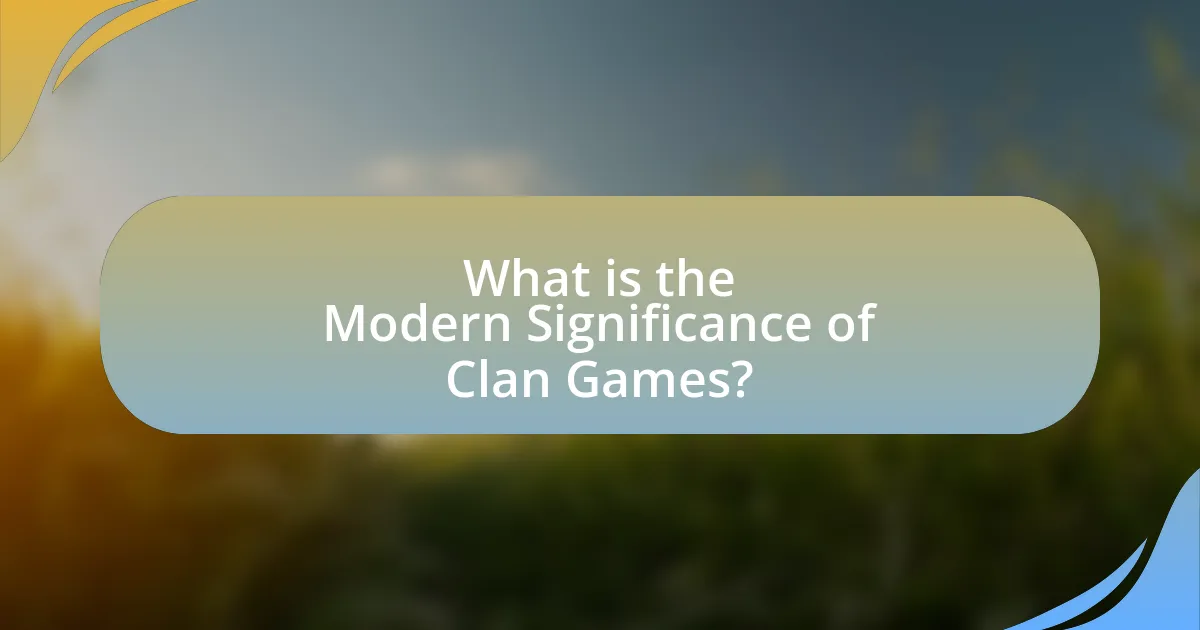
What is the Modern Significance of Clan Games?
The modern significance of Clan Games lies in their role as a cultural celebration that fosters community identity and heritage among Scottish clans. These events serve as a platform for showcasing traditional Scottish sports, such as caber tossing and tug-of-war, which not only preserve historical practices but also promote physical fitness and teamwork. Additionally, Clan Games attract participants and spectators from around the world, enhancing tourism and economic activity in local areas. The continued popularity of these games reflects a growing interest in cultural heritage, as evidenced by the increasing number of events held globally, such as the World Highland Games, which draws thousands of attendees each year.
How do Clan Games contribute to tourism in Scotland?
Clan Games significantly contribute to tourism in Scotland by attracting visitors who seek to experience traditional Scottish culture and heritage. These events, which include competitions in traditional sports such as caber tossing and tug-of-war, draw thousands of spectators and participants each year, boosting local economies. For instance, the Cowal Highland Gathering, one of the largest Highland Games, attracts over 20,000 visitors annually, generating substantial revenue for local businesses. Additionally, Clan Games promote cultural exchange and awareness, as tourists engage with Scottish history and customs, further enhancing Scotland’s appeal as a travel destination.
What economic benefits do Clan Games bring to local communities?
Clan Games provide significant economic benefits to local communities by attracting tourism, generating revenue, and fostering local business growth. These events draw visitors who spend money on accommodations, food, and local attractions, thereby boosting the local economy. For instance, a study by the Scottish Government indicated that events like the Highland Games can generate millions in economic impact for host communities, with some events reporting up to £1 million in direct spending. Additionally, Clan Games create opportunities for local vendors and artisans to sell their products, further stimulating economic activity.
How do Clan Games attract international visitors and participants?
Clan Games attract international visitors and participants by showcasing unique cultural heritage and traditional sports that resonate globally. These events feature activities such as caber tossing and tug-of-war, which draw spectators and competitors from various countries, eager to experience authentic Scottish culture. The games often include music, dance, and local cuisine, enhancing the overall appeal and creating a festive atmosphere that encourages tourism. Additionally, the promotion of Clan Games through social media and international marketing campaigns increases visibility, attracting a diverse audience interested in cultural exchange and sporting competition.
What are the challenges facing Clan Games today?
The challenges facing Clan Games today include declining participation, competition from modern sports, and the need for financial support. Declining participation is evident as fewer individuals engage in traditional events, which can be attributed to changing interests and lifestyles. Competition from modern sports, which often offer more accessible and varied entertainment options, further diminishes interest in Clan Games. Additionally, financial support is crucial for organizing events, and many Clan Games struggle to secure adequate funding, impacting their ability to promote and sustain these traditional sports.
How do modern societal changes impact the participation in Clan Games?
Modern societal changes significantly impact participation in Clan Games by altering community engagement and cultural priorities. Increased urbanization and digital connectivity have shifted focus away from traditional gatherings, leading to reduced attendance at these events. For instance, a study by the Scottish Government in 2020 indicated that participation in local cultural events, including Clan Games, has declined by 15% over the past decade, primarily due to competing interests such as online entertainment and busy lifestyles. Additionally, changing demographics, with younger generations often prioritizing globalized sports over local traditions, further diminishes involvement in Clan Games.
What efforts are being made to preserve the tradition of Clan Games?
Efforts to preserve the tradition of Clan Games include organizing annual events that celebrate Scottish heritage, such as the Scottish Highland Games, which feature traditional sports and cultural activities. These events often receive support from local governments and cultural organizations, ensuring they remain accessible to the public. Additionally, educational programs are implemented in schools to teach students about the history and significance of Clan Games, fostering a sense of pride and continuity in Scottish culture. Furthermore, community groups actively engage in promoting Clan Games through social media and local outreach, increasing awareness and participation among younger generations.
What can participants and spectators expect from Clan Games?
Participants and spectators can expect a vibrant display of traditional Scottish sports and cultural heritage during Clan Games. These events typically feature competitions in activities such as caber tossing, tug of war, and hammer throw, showcasing strength and skill. Additionally, participants and spectators will experience a festive atmosphere with music, dance, and local food, reflecting the rich cultural traditions of Scotland. Clan Games serve as a gathering point for communities, fostering camaraderie and pride in Scottish heritage, which is evidenced by the long-standing history of these events dating back centuries, often linked to clan gatherings and celebrations.
How can one prepare for attending or participating in Clan Games?
To prepare for attending or participating in Clan Games, individuals should familiarize themselves with the specific events and rules of the games, as well as the cultural significance behind them. Understanding the various competitions, such as caber toss or tug of war, allows participants to train effectively and spectators to appreciate the skills involved. Additionally, participants should engage in physical training tailored to the events they will compete in, as many require strength, agility, and endurance. Researching local Clan Games and connecting with clan members can also enhance the experience, fostering a sense of community and tradition.
What are the best practices for engaging with Clan Games as a newcomer?
To engage effectively with Clan Games as a newcomer, it is essential to familiarize yourself with the event’s traditions and rules. Understanding the history and significance of Clan Games enhances participation and appreciation. Actively participating in various events, such as tug-of-war or caber tossing, allows newcomers to experience the culture firsthand. Additionally, connecting with clan members and seeking guidance fosters a sense of community and belonging. Engaging in practice sessions can improve skills and confidence, making the experience more enjoyable. These practices are supported by the fact that Clan Games emphasize teamwork and cultural heritage, which are integral to their success and enjoyment.
